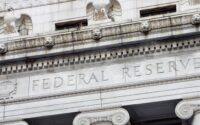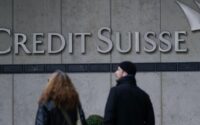Banks Saddled With $30 Billion in Unwanted Debt in Risk Exodus
(Bloomberg) — The world’s biggest banks have already had to use about $30 billion of their own cash this year to fund loans for acquisitions and buyouts that they weren’t able to offload to investors.
Most Read from Bloomberg
The lenders have been forced to fund at least 15 deals in the US and Europe as inflation and fears of a recession sap investor appetite for risky corporate debt. The total tally, based on calculations using data sourced by Bloomberg, could nearly double over the coming months as more deals are scheduled to close.
While it’s not uncommon for banks to self-fund deals when market sentiment sours, the sheer amount of hung debt — including $3.9 billion for Apollo Global Management Inc.’s purchase of Brightspeed and more than $8 billion for a buyout of Nielsen Holdings Plc — is deterring banks from making new financing commitments.
Why Banks Face Billions in ‘Hung Debt’ as Deals Cool: QuickTake
“Risk departments are going to be loathe to allow banks to make additional commitments and balance-sheet risks going forward,” said Steven Oh, global head of leveraged finance at Pinebridge Investments LLC. “There still are going to be some LBO transactions, but it’s going to be hard because it’s going to be more costly — and the banks themselves are less likely to provide guaranteed underwriting.”
That’s a problem as private-equity sponsors sit on a mountain of deployable capital and fear of a recession ripens public markets for takeovers. Private-equity funds had about $1.2 trillion on hand as of mid-2022, according to data from Pitchbook.
Moreover, banks have about $43 billion of US high-yield bonds and leveraged loans in the pipeline, with about $30 billion expected to launch by the end of the year, according to an Oct. 17 report by Deutsche Bank AG.
That includes the $12.5 billion original financing package for Elon Musk’s buyout of Twitter Inc., which banks led by Morgan Stanley are on the hook to fund, as well as $5 billion of debt for Apollo’s buyout of Tenneco Inc.
In Europe, underwriters are sitting on €1.5 billion ($1.5 billion) of term loans to fund the buyout of Unilever’s tea business Ekaterra, which has yet to launch. Earlier this month, banks led by ING Bank NV pulled a €274.3 million loan supporting Dutch-based artificial grass maker TenCate Grass Holding BV’s takeover of Hellas Construction Inc.
Even as Asia’s fledgling leveraged loan business booms, a takeover of Toshiba Corp. — which could be the region’s biggest buyout this year — is at risk of slipping behind schedule. Bidding groups are struggling to secure financing commitments from banks, Bloomberg reported earlier this week.
Looking Elsewhere
With the amount of hung debt already in the tens of billions, some are looking to private credit markets to fill any gaps — though there’s also been some pullback there as well.
Still, the year is providing a once-in-a-generation opportunity for private credit to increase market share, said Todd Koretzky, a partner in the leveraged finance group at Allen & Overy.
“It’s a perfect storm of opportunity and readiness,” he said. “The moment that the broadly-syndicated market was dislocated, the private credit funds were ready with large amounts of capital and the ability to write checks.”
Sponsors have also embraced other maneuvers. Private-equity firms have announced new acquisitions in recent weeks without debt financing in place, effectively backstopping the entire purchase price with cash from their own funds.
Elsewhere in credit markets:
Americas
Diebold Nixdorf Inc., an ATM maker that been struggling for years to keep up with debt and operating expenses, reached a restructuring deal with creditors that will provide new financing and buy it more time to repay debt.
-
Norinchukin Bank has pulled out of investing in a new collateralized loan obligation deal being sold by CVC Credit Partners, a rare step highlighting how quickly the Japanese CLO giant is stepping back from the market
-
Barclays Plc has hired Rob Zahra, a securitized products trader at Credit Suisse Group AG in New York, according to his LinkedIn profile
-
Wall Street is growing increasingly confident that Elon Musk will complete his $44 billion buyout of Twitter Inc. on time
-
Toronto-Dominion Bank’s US commercial lending chief sees loan demand growing even as the Federal Reserve aggressively hikes rates that are already at the highest since 2008
-
Vanguard Group Inc. is preparing its debt funds for a recession, using selloffs in the world’s beleaguered credit markets to buy higher-quality assets at a discount
-
For deal updates, click here for the New Issue Monitor
-
For more, click here for the Credit Daybook Americas
EMEA
A handful of borrowers tapped Europe’s primary market on Thursday, with a new sterling mandate emerging to test investor appetite amid the political upheaval in the UK.
-
Northumbrian Water Ltd. is the first sterling bond mandate in over a month, with the utility holding investor calls for a 12-year sale of at least £250 million ($282 million)
-
Bankers are starting to analyze all the ways in which climate change will affect the value of their trading operations, according to a joint study by the International Swaps and Derivatives Association and Ernst & Young
-
UniCredit SpA has put a package of about €1.5 billion in unlikely-to-pay and non-performing loans up for sale, MF reports without citing anyone
Asia
China’s high-yield dollar bonds declined Thursday amid gains in sovereign-debt yields across Asia and falling equity prices as inflation worries persist.
-
The cost of insuring bonds against default rose for a second day in Asia as debt yields climbed on concern that strong inflation and aggressive rate hikes will weigh on global economic growth
-
Asia issuers still have strong interest in selling ESG notes despite the global bond rout that’s curtailed supply this year, said Madhur Agarwal, JPMorgan’s head of DCM origination for Asia ex-Japan. The bank said at a Wednesday press briefing it expects ESG notes to make up 35%-40% of the region’s sovereign, corporate and bank issuance in 2023
–With assistance from Harry Suhartono, Davide Scigliuzzo, Hannah Benjamin-Cook and James Crombie.
(Updates to add first bullet in Americas section. An earlier version of this story corrected a figure in chart.)
Most Read from Bloomberg Businessweek
©2022 Bloomberg L.P.
[ad_2]
Source link


